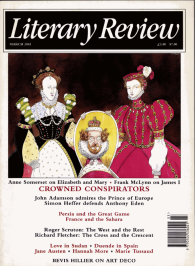Allan Massie
Caught By Surprise
The Fall of France: The Nazi Invasion of 1940
By Julian Jackson
Oxford University Press 327pp £17.99
IN JANUARY 1940 the Chef of the Imperial General Staff, General Sir Edmund Ironside, recorded his impressions of the French army after a tour of inspection. In his diary he wrote, 'I say to myself that we must have confidence in the French army. It is the only thing in which we can have confidence. Our own army is just a little one and we are dependent on the French. We have not even the same fine army we had in 1914. All depends on the French army and we can do nothing about it. . .'.
That was six months into the Phoney War. Six months later, after six weeks of battle, the French army had been defeated and the new French Government, headed by Marshal Petain, sued for an armistice. Halfway through the fighting the British Expeditionary Force, or most of it, had been evacuated

Sign Up to our newsletter
Receive free articles, highlights from the archive, news, details of prizes, and much more.@Lit_Review
Follow Literary Review on Twitter
Twitter Feed
Under its longest-serving editor, Graydon Carter, Vanity Fair was that rare thing – a New York society magazine that published serious journalism.
@PeterPeteryork looks at what Carter got right.
Peter York - Deluxe Editions
Peter York: Deluxe Editions - When the Going Was Good: An Editor’s Adventures During the Last Golden Age of Magazines by Graydon Carter
literaryreview.co.uk
Henry James returned to America in 1904 with three objectives: to see his brother William, to deliver a series of lectures on Balzac, and to gather material for a pair of books about modern America.
Peter Rose follows James out west.
Peter Rose - The Restless Analyst
Peter Rose: The Restless Analyst - Henry James Comes Home: Rediscovering America in the Gilded Age by Peter Brooks...
literaryreview.co.uk
Vladimir Putin served his apprenticeship in the KGB toward the end of the Cold War, a period during which Western societies were infiltrated by so-called 'illegals'.
Piers Brendon examines how the culture of Soviet spycraft shaped his thinking.
Piers Brendon - Tinker, Tailor, Sleeper, Troll
Piers Brendon: Tinker, Tailor, Sleeper, Troll - The Illegals: Russia’s Most Audacious Spies and the Plot to Infiltrate the West by Shaun Walker
literaryreview.co.uk